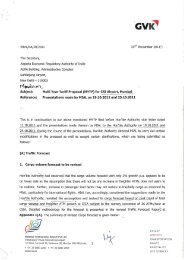Association of Private Airport Operators(APAO - AERA
Association of Private Airport Operators(APAO - AERA
Association of Private Airport Operators(APAO - AERA
Create successful ePaper yourself
Turn your PDF publications into a flip-book with our unique Google optimized e-Paper software.
<strong>Association</strong> <strong>of</strong><strong>Private</strong> <strong>Airport</strong> <strong>Operators</strong><br />
Response to <strong>AERA</strong> 's Consultation Paper No. 32/2011-12 lit. 03 Jail 2012 011<br />
determination otAeronautlcal Tarittin resoect <strong>of</strong>IGI Almon. New Delhi<br />
29111 February 2012<br />
infrastructure sectors where regulators provide a pre-specified return on the capital<br />
employed by the concessionaire and do not consider the sources and associated costs <strong>of</strong><br />
capital while calculating tariff. <strong>APAO</strong> would like to humbly submit that the Authority<br />
should consider providing returns on RSD commensurate with the return on equity.<br />
1.7 Cargo Revenues: <strong>AERA</strong>'s stand <strong>of</strong> treating cargo revenue <strong>of</strong> DIAL from<br />
concessionedloutsourced cargo services as non-aeronautical is well appreciated.<br />
However treating cargo revenue as "aeronautical" during the period it was handled<br />
directly by DIAL would be inconsistent with the provisions <strong>of</strong> OMDA. The provisions<br />
<strong>of</strong> concession <strong>of</strong>fered by the Central Government and the Act may be reconciled<br />
harmoniously by treating cargo services for the period it was directly handled by DIAL<br />
as "aeronautical" (to be consistent with the provisions <strong>of</strong> the <strong>AERA</strong> Act) , but<br />
considering revenue from cargo services as revenue from Revenue Share Assets (as per<br />
the concession <strong>of</strong>fered by the Central Government), 30% <strong>of</strong> which may be considered<br />
as revenue for calculation <strong>of</strong> aeronautical tariffs.<br />
1.8 Hypothetical Regulatory Asset Base (HRAB): DIAL has incurred additional<br />
manpower expenses during the operation support period, where both AAI and DIAL<br />
staff were employed to support the transition. The manpower expenses were the highest<br />
in FY 2009 which was the last full financial year in the Operation Support Period<br />
(OSP), and also the reference point for determination <strong>of</strong> the HRAB. The duplication <strong>of</strong><br />
manpower expenses only pertains to the OSP and is not a recurring expense during the<br />
control period. <strong>APAO</strong> would like to submit that only the sustainable manpower cost,<br />
i.e. the manpower cost related to AAI staff may be considered by the Authority for<br />
determination <strong>of</strong> I-IRAB. Additionally, <strong>APAO</strong> would also like to request the Authority<br />
to adopt a consistent approach for treatment <strong>of</strong> cargo revenue both for the purpose <strong>of</strong><br />
calculating I-IRAB and determination <strong>of</strong>tariffs.<br />
1.9 Service Quality: The OMDA already provides for penalties for deficiencies or defaults<br />
in performance or service quality. <strong>AERA</strong>'s proposal to levy additional penalties for<br />
defaults in service quality would amount to additional cost burden for DIAL. There is<br />
no evidence <strong>of</strong> regulators in other infrastructure sectors imposing dual penalties on<br />
service providers. While <strong>APAO</strong> recognizes that regulating service quality is a statutory<br />
obligation <strong>of</strong> the Authority, the objectives <strong>of</strong> incentivizing service quality and<br />
penalizing poor performance are achieved per force by the provisions <strong>of</strong> the OMDA<br />
and are consistent with the objectives <strong>of</strong> the Authority.<br />
<strong>APAO</strong> requests the Authority to duly recognize the provisions <strong>of</strong> OMDA with regard to<br />
penalties on specific defaults in service quality. <strong>AERA</strong> may observe the process<br />
followed by AAI in reviewing cases <strong>of</strong> defaults and imposition <strong>of</strong> penalties there<strong>of</strong>, and<br />
satisfy itself that the actions taken are in compliance with the OMDA<br />
1.10 DF Collection charge: DIAL has been allowed to collect OF to part fund the capital<br />
expenditure. Collection charges with respect to OF are similar to the financing expenses<br />
paid to the lenders for arranging debt. The Authority has considered such financing<br />
expenses as part <strong>of</strong> the capital expenditure which are allowed as part <strong>of</strong> the tariff<br />
calculation. Additionally, OF collection charges have been mandated by the DGCA<br />
vide Directive Number AIC s. no. 2/2009 dated 28 1h February 2009 . However, this<br />
directive was later cancelled in June 2011 following Delhi High Court's order' to stop<br />
I Source: http://dgca.nic.in/aic/aic07_20 Il.pdf<br />
Page 5 <strong>of</strong>41
















